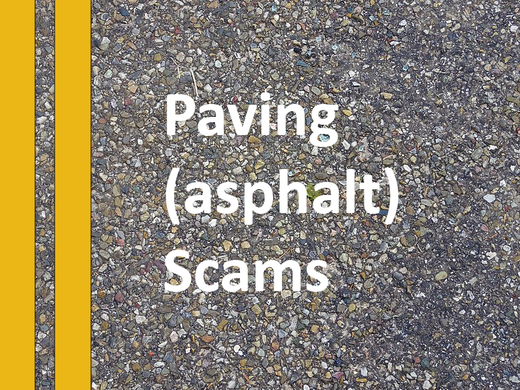Helpful information from (Government of Canada) Canadian Centre for Cyber Security on identifying Misinformation, Disinformation and Malinformation:
Online Crime Reporting (RCMP)
Residents should report crimes to the RCMP (as reporting means it is followed upon with reporting, investigation and other means). Reporting can be done to the Detachment the crime occurred (lamontcounty.ca/departments/emergency-services/rcmp) - use the non-emergency line unless an incident is in progress or you are in danger.
Certain types of crimes online using the RCMP’s Online Crime Reporting (OCR) tool. The tool can be used for:
- Lost items valued under $5,000;
- Stolen items valued under $5,000;
- Property or vehicle vandalism with repair costs under $5,000;
- Theft over $5,000 for oil, telecommunications, or utility companies; and
- Hate-motivated incidents (non-criminal actions motivated by hate or bias).
To report online, visit the RCMP's OCR website or scan the QR code.
The following are tips and awareness for residents to prevent fraud, scams and rural crime:

Some of the common fraud and scam activities to be aware of:
TIP: When in doubt, do not provide personal information, hang up the phone/end a chat and contact a trusted individual (family/friend) for additional confirmation or support.
- Romance scams: Initiated on dating or social media sites, scammers build relationships over time before asking for large sums of money. The perpetrator says they can't video chat for technical reasons, but it’s because a video call would reveal that they aren’t who they say they are.
- Sweepstakes scams: Scammers claim you won a lottery or other prize, but you must pay taxes or fees to claim the prize. It’s often a contest or lottery the victim never even entered.
- Grandparent scams: Impersonating a relative, often a grandchild, the fraudster phones in a panic saying they’re in trouble and need money to be sent immediately. The phone is then handed to their “attorney” or “representative” before you can clearly recognise the voice. Often the fraudster will say “Don't tell my parents,” and “You're the only one who can help.”
- Computer software or virus scams: A pop-up ad or email says your computer has been hacked and demands payment from you. Once you engage, they use extreme pressure tactics to push for more funds or gift cards.
- Government agency scams: The scammer impersonates someone from the Canada Revenue Agency or another government agency, demanding payment or a transfer of funds so you can avoid a penalty or jail time.
- Gift card scam: If someone posing as a legitimate source or business asks you to pay for something by putting money on a gift card, it’s a scam. They say it’s urgent, may tell you to purchase several different gift cards, and then ask you to share the gift card number and pin. Once you do, your money is gone.
- Undercover investigation scam: Criminals pose as legitimate sources like law enforcement or your bank and trick you into providing money to help with a criminal investigation. There are many variations, but the scammer often claims they are investigating an employee at a bank branch and they need the victim to withdraw a large sum of money to be used as evidence. It may happen over multiple days. The victim is told not to tell anyone they’re involved and that the money will be returned. Remember, a business, government agency or your bank will never ask you to participate in an undercover operation to prevent fraud.
Any older adults can also send an email to michelle.a@lamontcounty.ca if you want to confirm any suspicious email or conversations. Lamont County Family and Community Support Services offers sessions on fraud prevention for older adults in the spring and fall each year. Sessions will be posted at: lamontcounty.ca/community-programming.

Beware of paving and roofing scams this summer
Contractors' claim to have leftover materials from previous jobs and offer to pave driveways and parking lots, or roofing at reduced pricing. Companies may use business names that suggest they are affiliated with a government road maintenance department and typically provide false addresses or contact information. After contractors collect payment and disappear from the area, customers discover the materials used are poor quality and the work is unprofessional. Victims are left unable to contact the scammers and face expensive asphalt repairs.
Some warning signs
- Watch out for sales pitches like these:
- Limited offer: “This is a special price. It’s only available today. Tomorrow the price goes up!” The so-called “special price” may really be the standard, everyday price.
- Price advantage: “We’ll give you a good deal if we can advertise that you are a satisfied customer.” The supposed deal may not be in your best interest.
- Misrepresentation: “I’m doing a survey for (names a company or government department) and wonder if you could answer a few questions?” The salesperson may be lying and just wants to gain entry to your home.
Asphalt Paving Scams
- Paving contractors may approach your home telling you they are working in the area and have leftover material.
- They may claim they are working on projects for the local municipal or county governments.
- They may pressure you to make a quick decision without providing time to research other businesses.
- They may use high-pressure tactics and discounted prices to make you think you are getting a deal.
- There usually is not a written estimate or contract detailing what is to be provided – no specifics on how the driveway will be prepared prior to asphalt application, no dimensions of the area to be paved, and no measurements on the thickness of the asphalt.
- These companies often do not provide information on the name of their business, or its address.
- Customers are often told that they will not be able to drive on the finished asphalt for days or weeks.
- Victims often find that, when they do drive on the asphalt, it cracks, crumbles and falls apart. The paving company is usually long gone and is not reachable.
- Other unscrupulous contractors have offered products such as driveway sealants. The cost may be higher than what other reputable businesses offer, and the quality of the sealant product may be questionable.
What you can do
- Research online. Check the Business Enforcement Search Tool (www.alberta.ca/lookup/business-enforcementsearch-tool.aspx) via Alberta.ca to see if the company has had any past enforcement actions placed on it. Check the Better Business Bureau website at www.bbb.org, social media, and search the company’s name on the Internet.
- Ensure you verify a legitimate physical address for the business.
- Ask for references and verify if previous customers were satisfied.
- Ask to see municipal and provincial business licenses.
- Obtain written estimates and contracts from other companies that are detailed and fully describe the goods and services to be provided.
- Establish the total “all-in” cost of the project.
- Never pay in cash.
- Never make a rushed decision. If the offer sounds too good to be true it probably is.
How you can report it
To report a possible paving scam or other consumer related issues, including anonymous tips through:
- Report a Rip Off phone line: contact the Service Alberta and Red Tape Reduction Contact Centre at 1-877-427-4088.
- Filing a Consumer Complaint: information is available at www.alberta.ca/file-consumer-complaint.aspx.
Consumer Investigations Unit Edmonton:
3rd Floor, Commerce Place, 10155-102 Street, Edmonton AB T5J 4L4
Calgary: Suite 301, 7015 Macleod Trail SW, Calgary AB T2H 2K6
- Contact your local RCMP Detachment.
Alberta RCMP are warning the public about a text message scam involving speeding violation tickets.
RCMP have received reports of a scam that is circulating throughout Alberta. The scam involves the victim receiving a text message stating that their vehicle has been detected exceeding the speed limit and has a link to a website to pay a ticket. Do not click on the link and do not make any payments to the website.
RCMP would like to remind the public that government and police organizations do not issue tickets via text messaging. If you receive any suspicious text messages do not reply and do not click any links. If you are unsure if a message or phone call is fraudulent, the RCMP encourages you to contact the person/business/organization to confirm.
If you suspect you have been a victim of fraud, please contact (Vermilion) RCMP at 780-853-5781 and the Canadian Anti-Fraud Centre either by telephone 1-888-495-8501 or online at https://antifraudcentre-centreantifraude.ca. Victims of identity fraud should also report the incident to Canada’s credit bureaus, Equifax and Transunion. To report crime online, or for access to RCMP news and information, download the Alberta RCMP app through Apple or Google Play.
In light of the growing popularity of cryptocurrency investments, RCMP Financial Crime Unit is warning the public to remain vigilant and informed before committing their hard-earned money to investments in cryptocurrency.
RCMP has been noticing a significant rise in fraudulent investment schemes, with counterfeit cryptocurrency investment platforms preying on unsuspecting individuals. For example, since January 2023, over $6.4 million in losses through cryptocurrency was reported by Strathcona County residents.
Cryptocurrencies come with inherent risks, especially when investors do not conduct thorough research. Fraudsters are creating professional-looking websites, promising high returns with little to no risk, and are convincing in luring victims into handing over their money.
These scams are designed to look legitimate, making it even more important for potential investors to verify the authenticity of any platform or individual before engaging in transactions. In particular, the RCMP has seen victims being targeted through Facebook advertisements, often citing that their "platforms" are “endorsed” by high profile persons.
Red flags to watch out for when investing in cryptocurrency:
- Promises of guaranteed returns: No legitimate investment can guarantee consistent profits, especially in the volatile cryptocurrency market;
- Pressure to act fast: Scammers often create a false sense of urgency to prevent victims from investigating further;
- Unverified platforms: Always research the platform's credentials, reviews, and regulatory compliance before transferring any funds;
- Lack of transparency: Be wary of platforms or individuals that do not provide verifiable contact information or clear terms of service;
- Remote access to devices: In many circumstances, the scammers will request to put software on victim’s computers or smartphones that allow remote access to “help” victims with their investments (e.g., AnyDesk);
- Promises to pay out funds: If a victim already finds themselves investing, and they want out of their investments, the scammer will ask victims to pay more funds to pay for things such as “taxes”, “errors with the financial institutions”, etc. The scammers are trying to trick victims into giving them more money before the victims pull out of the scam.
Safety tips to follow when investing in cryptocurrency:
- Educate yourself: Learn about how cryptocurrency works, including its risks and rewards. If in doubt, do not consider investing.
- Use trusted platforms: Stick to well-known and regulated exchanges for buying and trading cryptocurrency. Alternatively, use local financial advisors that you can speak with in person.
- Verify legitimacy: Cross-check the platform's reputation through independent reviews and trusted sources.
- Be skeptical: If an opportunity sounds too good to be true, it probably is.
Victims of cryptocurrency scams are encouraged to report fraud incidents to the their local police (RCMP) and the Canadian Anti-Fraud Centre. It is very difficult to recover victims’ funds, as cryptocurrency moves quickly, and often out of the country to exchanges or countries that Canadian Authorities may not be able to work with.
However, raising awareness can help protect others from falling victim to similar fraud schemes.
As winter temperatures fluctuate, the RCMP is set to launch Operation Cold Start, an initiative aimed at reducing the theft of idling vehicles. This annual campaign focuses on working with the public to address crimes of opportunity that occur when vehicles are left running, unlocked, and unattended.
Last year, many areas in Alberta experienced several thefts involving idling vehicles. These incidents not only caused inconvenience for vehicle owners, but also posed broader risks to community safety, as stolen vehicles are often used to commit additional crimes or sold to unsuspecting buyers.
Operation Cold Start campaign initiated January 20 to January 24, 2025, with officers from the RCMP performing various enforcement to help keep vehicles safe. Officers can/will check unattended idling vehicles to ensure that keys are not left inside and that they are properly secured. Officers will also participate in educational efforts to teach the public how to better protect their property.
As part of these efforts, the RCMP is sharing the following tips to help individuals safeguard their vehicles:
- Park in a visible, well-lit area if a garage or driveway is unavailable.
- Use visible anti-theft devices, such as steering wheel locks, to deter thieves.
- Consider installing an automatic car starter to safely warm your vehicle.
- Never leave your vehicle unattended with the keys inside.
- Always lock your vehicle, even when parked in a driveway or garage.
- Avoid leaving valuables like wallets, purses, or spare keys visible in your vehicle.
- Most modern vehicles don’t require a long warm-up period; if warming up is necessary, stay with your vehicle.
For more information about Operation Cold Start or to learn more about vehicle theft prevention, follow the Alberta RCMP on Facebook @RCMPinAlberta and on X @RCMPAlberta.


